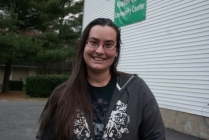
Photo by FeiFei Ma
With the semester’s workload at maximum capacity, students migrate from their dorms to the library, to The Commons, to wherever their studying safe haven may be. For first year Peaceworker Fellow Eleanor Brasfield, that haven is the Shriver Center.
With coffee brewing in the background and looking through red-rimmed glasses, Brasfield reflects on her years in the Peace Corps (2013-2016). “Zambia wasn’t my first choice, but I’m still grateful that I served there,” she said.
When applying for Peace Corps, Brasfield ranked her top three regions to serve as: Eastern Europe (hoping to apply her history major and minors in German and medieval studies), Northern Africa and Sub-Saharan Africa. Despite her ranking, Brasfield was nominated to serve in Peace Corps Zambia in both their environmental and agricultural sectors.
“I was chosen based on my resume, not because I requested a sector or a certain objective,” Brasfield said. In the past few years, Peace Corps has re-branded their application process, marketing it as “only taking an hour to apply” and allowing applicants to not only rank their preferred regions, but also preferred sectors of service: Agriculture, Community Economic Development, Education, Environment, Health and Youth in Development.
Brasfield’s primary focus while in Zambia was working with village leaders to increase food security and public health through sustainable practices. “My project was called ‘Linking Income: Food and the Environment.’ We challenged the community to think about how to improve their health and economy holistically, rather than just focusing on one or the other,” said Brasfield.
Cultural assimilation is a challenge that all volunteers learn to overcome and Brasfield is no exception. “Fitting in culturally is hard,” she said. “I had to convince my community that I was truly there to help and that I wasn’t a spy or a person hunting for gems,” Brasfield said.
“It’s the little things that you do that helps people trust you, like learning the language or participating in the community outside of work.”
Like some Peace Corps volunteers, Brasfield chose to serve for three years. However, unlike many of them, Brasfield chose to dive right back into student life immediately following her return to the states. Back in June of this year, Brasfield applied and was accepted to UMBC’s fellowship.
Most returned volunteers choose to take some time off between their service and work (either academic or professional). In a way, Brasfield did too, just considerably shorter… six weeks, to be exact.
“I didn’t want to wallow,” said Brasfield. “I didn’t want to have downtime to think about what I was missing. I wanted to be involved in something.”
Brasfield chose to come to UMBC because of the intercultural communications program offered and the school’s closeness to her home. “My mom was sort of scared she’d never see me again, but being close to home has helped the both of us.”
As a fellow, Brasfield works at the Walden Circle Community Center in Woodlawn, MD, which is a perfect way for her to apply her experiences from service and from her graduate program.
“I’m from Maryland, but even within our state, there are personal layers of culture to cross when working in a different community,” Brasfield said. “In a lot of ways, I feel like I’m in Peace Corps again because I have to take time to get to know the community.”
When asked to give advice to those thinking of serving in the Peace Corps, Brassfield simply said, “Just do it.”
Brassfield also suggests not to over pack the simple things like toothbrushes, soap and toilet paper. “All that stuff is there, don’t worry.”
The post Intercultural communications: From Zambia to Woodlawn appeared first on The Retriever.





